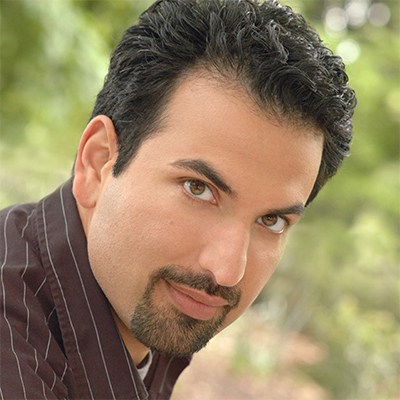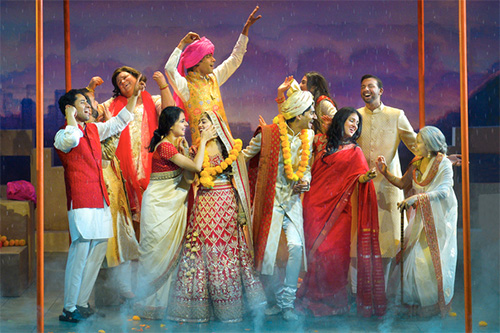by Daniel Hathaway

As a singing actor, he has appeared in Mira Nair’s new musical, Monsoon Wedding. As an actor, he’s played Shylock in Shakespeare’s The Merchant of Venice, been featured in a one-man play based on Khaled Hosseini’s The Kite Runner, and appeared on Law & Order, merely to skim the surface of his extensive brag sheet. His classical credentials include piano study at Peabody, where he earned the first of his two masters’ degrees.
Wadia, who will join Apollo’s Fire this weekend as a vocalist for its “O Jerusalem” shows, winds up his narrative noting that he’s now based back in Bombay, “but will jump on a plane for a gig at the drop of a hat.” I reached the hyper-versatile performer on his cell phone to ask how Jeannette Sorrell found him in order to drop that hat.
Sorab Wadia: I had played one of the princes and evil counselors in the world’s oldest extant music drama, The Play of Daniel, with the Gotham Early Music Society. One of the recorder players was Daphna Mor, who has played many times with Jeannette, and when Daphna heard that Jeannette was looking for a singer, she recommended me. Daphna knows that I’ve sung in synagogues, knows my voice, and knows that I can do Sephardic music.
Daniel Hathaway: Do you know anyone else in the Cleveland ensemble?
SW: I’ve worked with many people who play with Apollo’s Fire in different capacities. Karim Sulayman and I sang a duet together in a production of The Merchant of Venice. Billy Sims and I went to Peabody together and did Renaissance music decades ago, and now Billy is one of the most sought-after lutenists. It’s amazing and fun to see your colleagues prospering and going all over the globe doing their thing.
DH: What have you signed on for in the “O Jerusalem” program?
SW: I have an idea, but not a complete one because rehearsals haven’t begun yet. The program features music from the four quarters of Jerusalem. The bulk of the music that I’ll be doing is from the Jewish Quarter, with Ladino and Hebrew texts. I’m actually going to be replacing two soloists — tenor Karim Sulayman and baritone Jeffrey Strauss.
DH: I understand that Jeannette has worked some selections from the Monteverdi Vespers into the program to show the influence of Jewish cantors and Arabic singers on his music. I think you’re listed to sing the florid Gloria from the last movement of that work.
SW: Yes, and that scares me! I did the Vespers a long time ago — I think it was in New York in 2002, my first solo in an oratorio, and it’s a beast of a masterwork. Most of the music I’m singing is baritonal repertoire, since I’m taking over for Jeffrey, so to switch gears and do tenor in the Monteverdi is going to be a bit of a challenge.
DH: Your bio notes that you have a three-octave range!
SW: True, but I don’t often use my whole range in one concert. I’m not an Yma Sumac kind of person. I’ve done countertenor work, and I’ve done high falsetto work in musical theater and Medieval and Baroque music, and I’ve sung baritone and bass parts in other music, but I’ve never had to go back and forth in one 90-minute event, so I’ll give it my best shot and see how it goes.
DH: Will you be singing the primary or the echo tenor solo part?
SW: The echo, so I’ve asked to be located outside the hall so I may have some more leeway in terms of volume.
DH: It’s always fun to see where directors will locate the echo tenor. I heard the piece in Edinburgh once where the conductor had the echo singer perform from the men’s room.
SW: I’d love that. I’m game for everything. My background in theater makes me less afraid to make mistakes or be wrong or foolish. You have to try things out, throw spaghetti on the wall and see what sticks. If it sticks, good. If not, move on. Try something else.

SW: I’m going back on the 19th. Monsoon Wedding, the musical, is heading to India and other markets where there are a lot of Indophiles — London, Dubai, maybe Toronto. We were supposed to be on Broadway right now, but that didn’t materialize.
DH: You write in your bio that you are “infected with an unquenchable case of Wanderlust.”
SW: You go where the interest lies. I feel like I’m getting older now, and I want to do things that make my heart sing, and with people I like. I think this Cleveland concert is going to fit that bill because Jeannette seems to have really phenomenal people around her, and she knows how to curate her musicians very well. And the people I know in the band are fantastic people. We’re going to have musical fun and an interesting musical adventure. It’s a beautiful program.
DH: Have your travels taken you to Jerusalem?
SW: People from the Met Opera used to do a festival in Old Jaffa with young professionals, and students who were on the cusp of becoming professionals. I performed four operas in Tel Aviv the summers of 2000, 2001, and 2004. On my days off, I was perpetually going to Jerusalem. I found the city utterly fascinating. You could jump into a sherut, a little van or group taxi, and get a round trip ticket for five or ten dollars. We’d bum around the city during the Sabbath when the festival was dark. I can see why so many people rabidly want to claim it as their own. It is the crossroads of the ancient world. Every stone seems to have a history. When you go to the Garden of Gethsemane, you actually see olive trees that are over two thousand years old, and you realize that the people of Jesus’ time actually touched those trees. It’s mind-blowing.
In 2000, we had to move part of the festival to Italy because there were rumblings going on in Israel and some Americans were scared to leave New York. Well, a month later, September 11 happened on their soil and in their city. How’s that for irony? You can’t predict when you’re going to live and when you’re going to be gone. So carpe diem, baby!
DH: Do you ever regret not pursuing a career as a pianist?
SW: No. I just met an old friend for lunch who is on the faculty of the Scottish Conservatory — we grew up together in Bombay. I was very good at the piano, but I didn’t feel like I was a pianist. I can play the piano very beautifully, but that doesn’t mean I’m a pianist. It’s a very subtle difference. I remember the Far Side cartoon where an elephant is seated at the piano in a concert hall, with its two feet above the keys. The thought bubble reads, “What am I doing here? I’m a flutist!” Well, I’m an actor, I’m a singer. My teacher at Peabody, a good old Israeli lady who’s now at Juilliard, always told me I didn’t have the Sitzfleisch to be a pianist — to sit and practice eight or nine hours a day. I was more of an ensemble work type of person. I just enjoy doing many different things. I do play for friends, and I do have a recital in my head that I may put together in a few years, but if I don’t, there’re many interesting things in life. There’s lots of Shakespeare to learn, and lots of things to sing.
Apollo’s Fire presents “O Jerusalem! Crossroads of Three Faiths,” a musical and poetical tour of the Jewish, Christian, Arab and Armenian quarters of Jerusalem, from November 10-18 in Beachwood, Cleveland Heights, Fairlawn, Cleveland, and Avon Lake. Jeannette Sorrell conducts, with Apollo’s Singers, Amanda Powell, soprano, Sorab Wadia, tenor, Daphna Mor, recorder, ney, and vocals, Jacob Perry, tenor, Raha Mirzadegan, soprano, Ronnie Malley, oud and accordion, and Brian Kay, oud, lute, baglama saz, and vocals. Click here for details and tickets.
Published on ClevelandClassical.com November 6, 2018.
Click here for a printable copy of this article



